Last updated: 02.10.2025
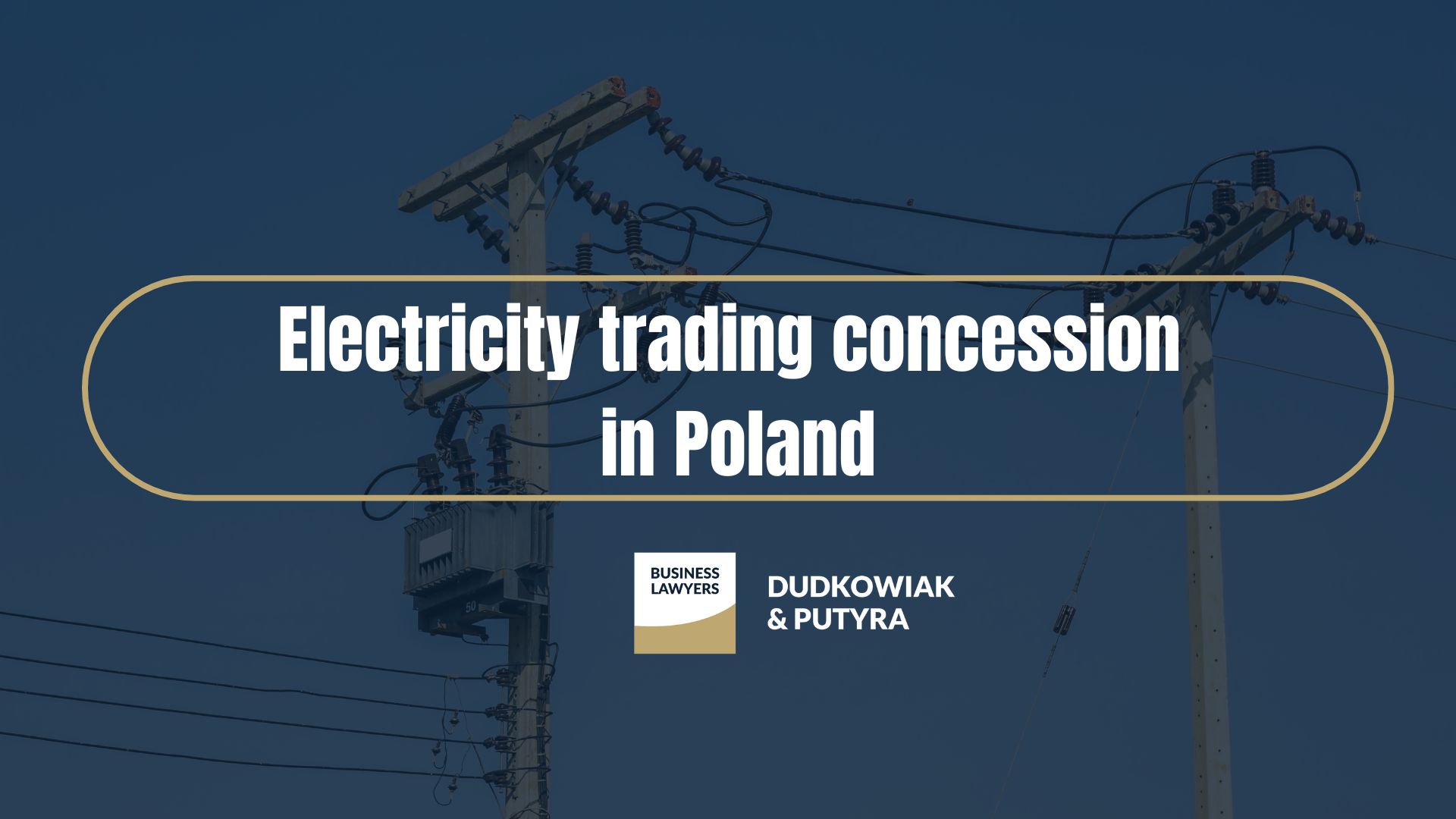
Energy Law & Electricity Trading Licence in Poland (OEE License)
In Poland, pursuant to the provision of Article 32(1)(4) of the Energy Law (hereinafter also referred to as the ‘Act’), the business of trading in electricity requires an appropriate concession.
Electricity trading, both at the wholesale and retail level, is strictly regulated by law and government rules to ensure market stability and protect the interests of clients and entrepreneurs across the energy sector and the country.
Requirements for Electricity Trading Licence in Poland
In order to obtain an electricity trading concession, the trader must meet a number of key requirements:
- Domicile – the trader must be established or domiciled on the territory of a Member State of the European Union, Swiss Confederation, Turkey, or a Member State of the European Free Trade Association (EFTA) or in a country which is a party to Agreement on the European Economic Area.
- Financial resources – it is essential to have the financial resources to guarantee the proper performance of the activity or to be able to document the ability to obtain them; this typically includes analysis, preparation, and evidence of expected revenues and costs.
- Technical capacity – the company must have adequate technical capabilities to ensure the proper performance and quality of the activity, including the safe distribution of electricity and relevant technology.
- Professional qualifications – the company must ensure employment of people with appropriate professional qualifications, particularly in the operation of networks, plant and equipment.
- Zoning decision – a zoning and land use decision is required for relevant energy construction projects.
- No tax arrears – a trader may not be in arrears in the payment of taxes unless he has obtained appropriate exemptions, deferrals or instalments of tax arrears.
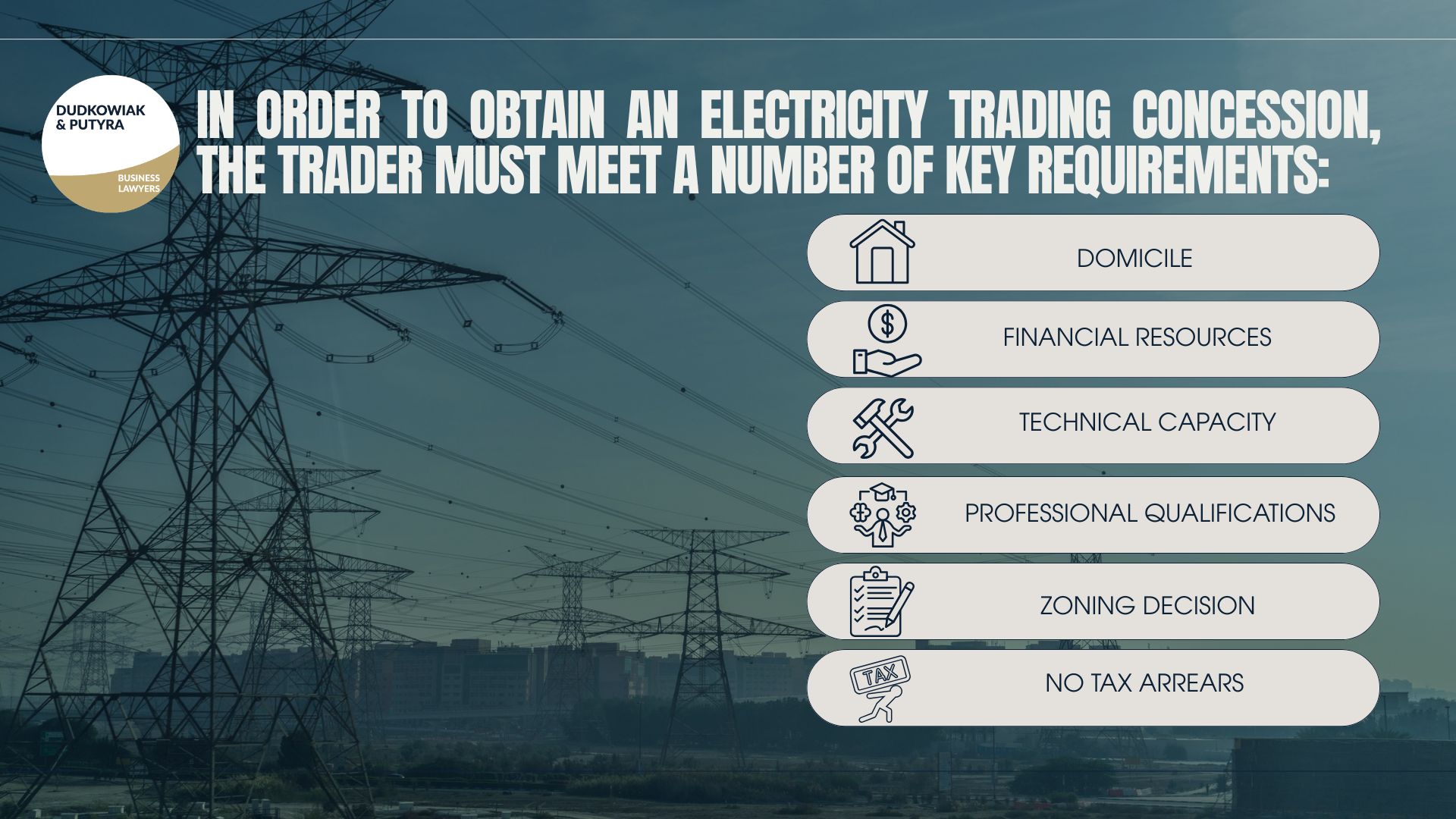
When is an OEE electricity trading license not required in Poland?
Subjective exemptions
- Commodity exchange and regulated market – trading in electricity on a commodity exchange or on a market organised by entities operating on the territory of Poland, such as a regulated market, commodity brokerage houses, exchange commodity trading houses, or companies operating a commodity exchange or exchange clearing house.
- National Depository for Securities – energy trading performed by the National Depository for Securities or by companies to which that depository has delegated the performance of its tasks.
- Energy Market Operators – the activities of designated electricity market operators, regulated by Regulation 2015/1222, are also exempt from requiring a electricity trading concession concession.
- Energy Co-operatives – energy co-operatives may trade in electricity as part of their business, provided it is for the benefit of co-operative members.
Subject exemptions
- Solid fuel trading: this includes hard coal and lignite.
- Trade in liquefied natural gas: the exemption covers gas delivered from abroad when it is traded at the point of delivery to a regasification terminal, e.g. in Świnoujście.
- Trading in gaseous fuels: is exempt from the electricity trading licence if the sale is for the purpose of liquidating compulsory stocks of natural gas held in accordance with the regulations.
- Trade in liquefied petroleum gas: the exemption applies to turnover the annual value of which does not exceed the equivalent of EUR 10 000.
- Heat trading: a electricity trading concession is not required if the capacity ordered by consumers does not exceed 5 MW.
A change to the exemption regarding the turnover of gaseous fuels (point 3) was introduced by the Polish Act of 5 August 2022. Previously, this exemption also covered situations where the annual value of turnover did not exceed €100,000.
The amendment was a response to concerns about leaving part of the turnover of gaseous fuels out of regulatory control, which could create risks for consumers. The importance of oversight is therefore crucial to quality outcomes and consumer support.
Do Energy Producers Need OEE Trading License?
Companies holding an electricity trading concession to produce fuels or energy are exempt from the obligation to obtain a separate concession for the trading of these raw materials if the sale is a secondary function of the production activity.
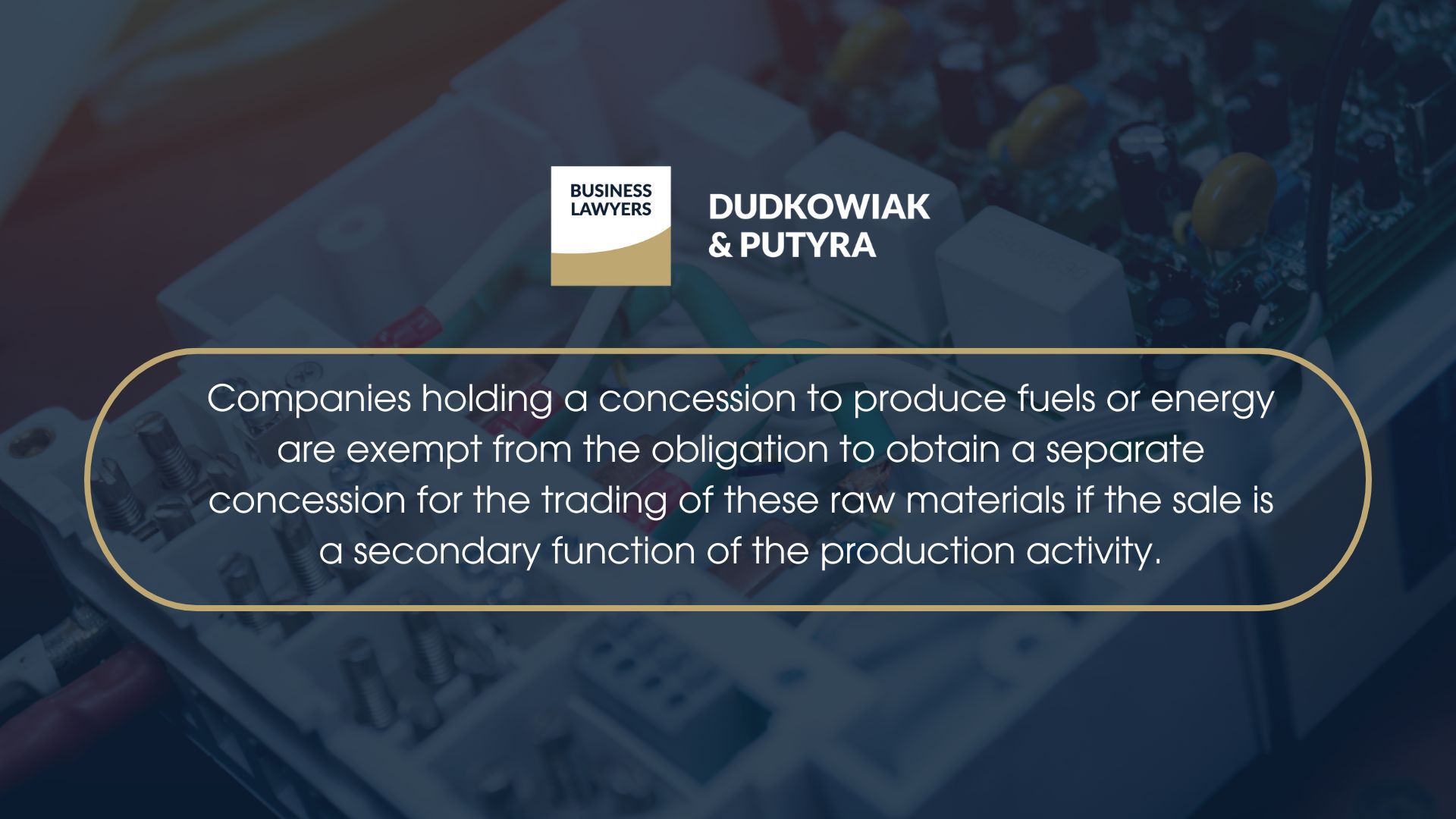
In this case, the trading activity is considered an integral part of the production process.
When your Energy Trading License will be refused?
- Applicants who are in insolvency or liquidation proceedings cannot be granted a concession.
- In the event that the applicant has had a concession revoked in the last three years due to violations listed in Article 41(3) of the Act (gross violation of the conditions of the concession or the law), he or she may not apply for a new electricity trading concession either. Likewise, if during the same period he or she has been removed from the register of regulated activities due to inconsistency of statements with the facts, failure to correct violations, or gross violation of the conditions for conducting licensed activities.
- Persons who have been convicted by final judgment of offences or fiscal offences related to their business activity are excluded from obtaining a electricity trading concession.
- The applicant must be registered for VAT, otherwise it will not be granted a electricity trading concession.
- If an entity that has significant influence over the applicant has been convicted of a business-related offence within the last three years, the applicant is also not eligible for a electricity trading concession.
Additional restrictions
For legal persons, unincorporated organisational entities and foreign entrepreneurs operating in Poland, obstacles to obtaining an electricity trading concession also apply to persons authorised to represent these entities and members of their supervisory boards.
Suspension of concession proceedings – President of the Energy Regulatory Office
The President of the Energy Regulatory Office (ERO) may suspend proceedings for the granting of an electricity trading concession if decisions on the presentation of charges of criminal or fiscal offences related to the business activity have been issued against the applicant or persons representing the applicant.
The proceedings shall be suspended until the completion of preparatory and judicial proceedings.
Refusal and revocation of an OEE electricity trading concession
The President of the ERO has the right to refuse to grant a concession if the applicant does not give the guarantee of proper performance of the activity covered by the concession.
In addition, a electricity trading concession may be revoked in cases such as:
- failure to commence the activity,
- loss of the concession,
- change in the conditions of the concessioned activity,
- or lack of guarantee of proper performance of the concessioned activity.
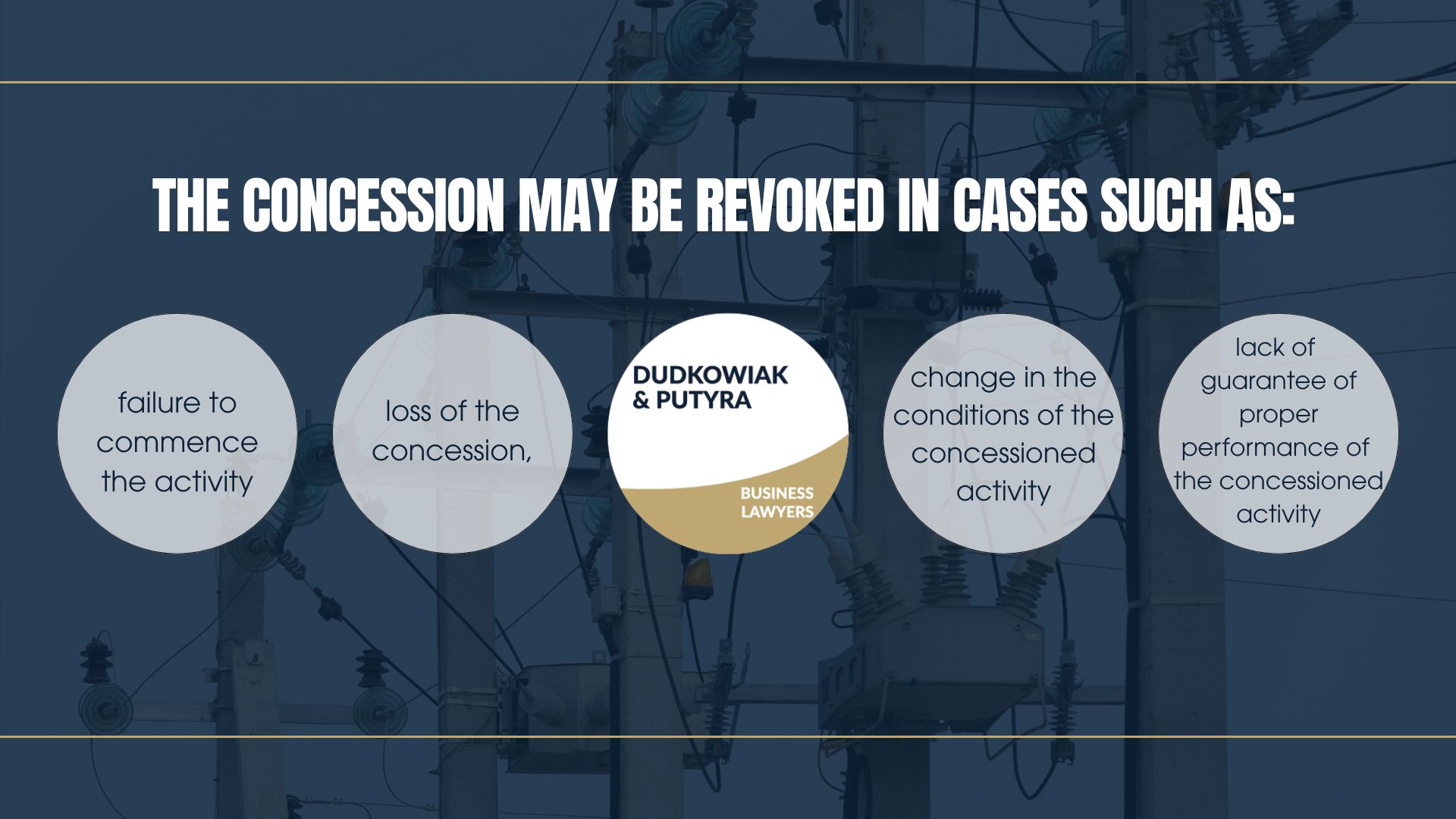
Promise of the electricity trading concession
Pursuant to the provision of Article 43 of the Act, persons or entities planning to conduct the business of trading in electricity may apply for a promise of a concession. This is a formal promise to issue or amend a concession, which specifies the future obligations of the regulatory authority, provided that the factual or legal situation does not change.
It has a collateral character, giving the entrepreneur the certainty that the concession will be granted in the future, provided that all legal requirements are met with the required documentation.
The Energy Law provides that the period of validity of a promise may not be shorter than six months. During this period, the authority may not refuse to grant or modify the electricity trading concession, unless there have been changes in the factual or legal status of the applicant as stated at the time of the application for the promise.
Although the promise of a concession does not, in itself, entitle the entrepreneur to carry out the concessioned activity, it can play an important role in the process of obtaining financing for the planned investment.
It can also facilitate future concession acquisition, as when applying for the promise, the entrepreneur must provide certain documents that are also required when applying for the concession itself. Pursuant to Article 43(5) of the Energy Law, the provisions of Article 35, which specify detailed requirements for the content and form of the application for a concession, apply to the application for a promise.
Amendment to Energy Trade Concession (OEE)
Changes to the concession may relate to formal and legal areas and the expansion of the scope of activities.
- Formal and legal changes may include, inter alia, a change of company name, address, registered office or partners in the company. In such a case, it is necessary to provide documents concerning the new legal situation of the concessionaire. For example, in the case of a change of address, up-to-date information from the National Court Register may be sufficient.
- Expansion of activities requires evidence of adequate technical and financial resources. This is relevant when the entrepreneur intends to expand into new areas.
Entrepreneurs are obliged to submit an application for a concession amendment within seven days of a change in data such as name, address, registered office or registration number. This obligation results from Article 37(2c) of the Energy Law. The deadline is calculated from the day following the announcement of the entry in the National Court Register.
Extension of the electricity trading concession
The renewal of an electricity trading concession requires the submission of an application at least 18 months before its expiry.
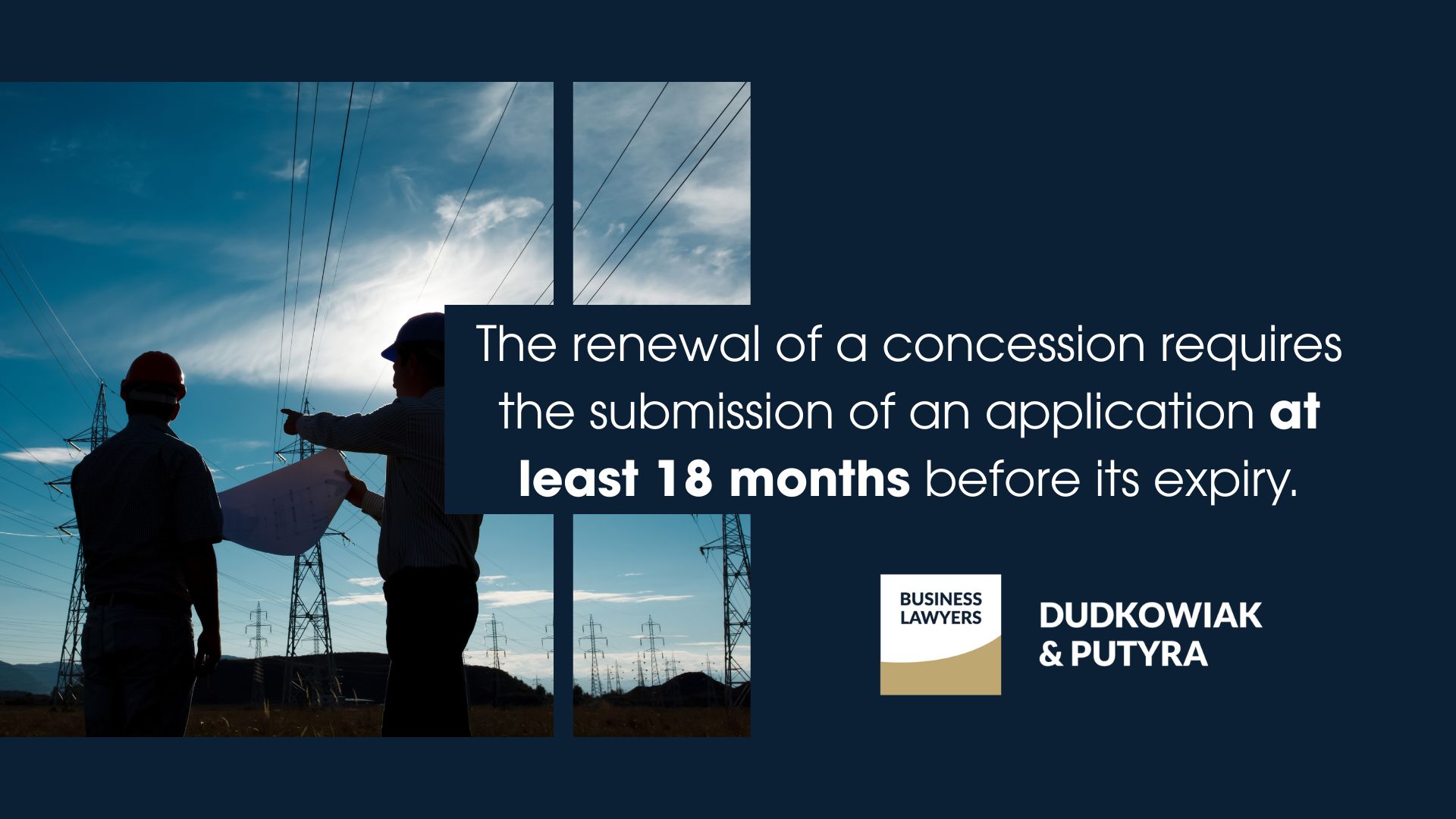
The application must include documents proving that the entrepreneur still meets the conditions required to carry out the concessioned activity. The process is analogous to applying for a new electricity trading concession, as the concession authority must reassess the applicant’s compliance with the statutory requirements.
If the application for the renewal of the electricity trading concession is not submitted in time, the entrepreneur must submit a new application for the concession. In such a case, it is necessary to provide documents in time for a decision to be issued before the expiry of the existing concession. All applications should comply with the provisions of the Code of Administrative Procedure.
Licensed business: how an electricity trading licence drives success?
Securing the electricity trading licence elevates your company to a licensed business, signaling regulatory confidence and operational readiness to counterparties and clients. With a clear compliance posture and robust operating model, you can integrate market interfaces, manage risk, and optimise portfolio flows across electricity distribution without disrupting service quality.
This disciplined approach-grounded in documentation, governance, and measurable performance-creates durable advantages that compound over time, translating regulatory approval into commercial momentum and long-term success.

